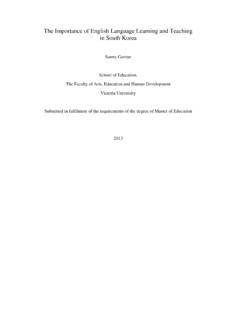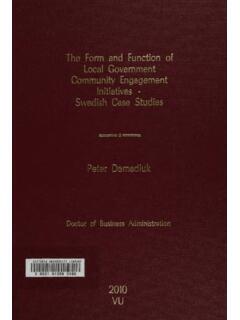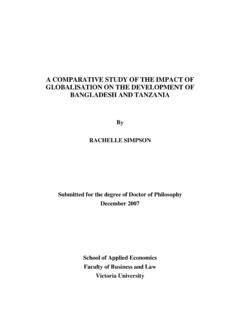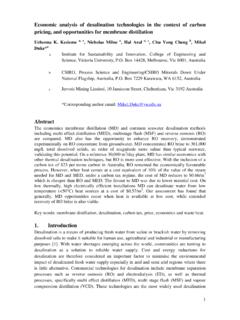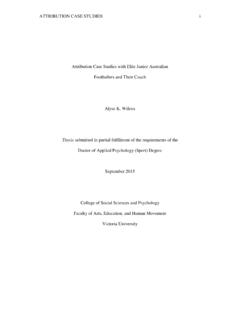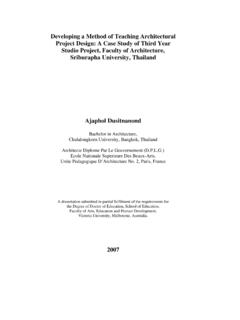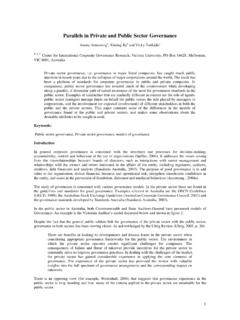Transcription of Professionalism and Ethics in Financial Planning
1 Professionalism and Ethics in Financial Planning June Smith Student No. 3643433. Submitted in fulfilment of requirements for the degree of Doctor of Philosophy 2009. Victoria University Melbourne, Victoria Australia School of Law Faculty of Business and Law - Flinders Street Campus School Centre Centre for International Corporate Governance Research Principal Supervisor: Professor Anona Armstrong Co Supervisor: Professor Ronald Francis ABSTRACT. Financial Planning advice is becoming increasingly relevant to the economic objectives of Australians. However, the evidence suggests there are numerous ethical risks related to the provision of that advice and other factors that may be influencing the ethical decision making of Financial planners and compliance officers in their respective roles.
2 The purpose of this study was to enhance understanding of the ethical decision making of these Financial Planning participants within this context. This study is therefore a significant one in what is a relatively under-researched area of interest. The study's purpose was converted into seven research questions, two of which concerned the primary types of unethical conduct occurring in the provision of Financial advice and respondent perceptions of the current ethical issues they face in their respective roles within Financial services organisations. Nine hypotheses were linked to the other research questions to measure whether there were statistically significant relationships between different constructs, and to test respondent perceptions of the ethical climate and culture of their organisation.
3 The conceptual framework underpinning the study recognized that there are numerous individual, situational and contextual predictors of ethical decision making. The predictors measured in this study included cognitive ethical reasoning and other individual attributes of the decision maker, such as their gender (H1), age, education, experience and accreditation to use the CFP professional designation (H2). The study also measured the influence of the situational and contextual factors associated with the organisational environment in which the decision was made. The situational construct measured was the size of the organization (Hitt 1990)(H3).
4 Contextual factors included remuneration source, (Bigel 1998) (H4), the respondent's role within the organization (Pennino 2002; Martin 2000) (H5), the ethical culture (Trevino, Butterfield & McCabe 1998) (H6) and the ethical climate of the organization (Victor and Cullen 1988) (H7 & 8), and the presence of ethical leadership (Schminke, Ambrose & Neubam 2005) (H9). i The research design utilised a mixed methods approach comprising both quantitative and qualitative research methods to test the seven research questions and nine hypotheses posed. The quantitative methods adopted included an analysis of consumer complaints against Financial planners between 2006 and 2007, so as to determine unethical conduct patterns.
5 A research questionnaire was also developed for the purpose of hypothesis testing. Qualitative methods adopted included the convening of a focus group to test perceptions of the current ethical issues facing Financial Planning participants. The primary dependent variable of cognitive ethical reasoning was measured by a profession specific test developed for the purposes of this study, called the Financial Advisory Issues Test. This instrument was based on previous research instruments, including the Defining Issues Test 2 developed by Rest et al. (1999b). The instrument was influenced by Kohlberg's (1976) model of moral development and Rest's (1984).
6 Theory of ethical development schemas. In addition, the ethical culture and climate constructs measured in this study were also operationalised by scales derived from previous research conducted by Trevino (1986) and Victor and Cullen (2001). To achieve the study's objectives, a number of different methods of data analysis were applied, including descriptive statistics, Pearson's product-moment correlation co- efficient and Spearman's correlation co-efficient. Correlation and regression analysis were chosen as the primary methods of data analysis because they are based on linear method, depend on normality assumptions and do not test for causality (Hansen &.)
7 Morrow 2003). The study identified the ten primary forms of unethical conduct by Financial planners in 2006-2007 and the top five ethical issues facing Financial Planning participants in their respective roles. The major conclusions drawn from the hypothesis testing included findings that cognitive ethical reasoning among respondents was positively related to older age, years of experience and the CFP professional designation, thus reaffirming previous research findings by Bigel (1998). The study also supported conclusions that Financial services organisations may not have in place relevant systems and procedures associated with ethical culture and compliance ii officers and Financial planners have different perceptions of the ethical climates within Financial services organisations.
8 Perceptions of ethical leadership within an organisation were also positively correlated to certain ethical climate types. The study makes numerous theoretical contributions to the existing academic knowledge base. In particular, it provides a comprehensive analysis of the patterns of unethical conduct in Financial Planning and the ethical issues facing Financial Planning participants in their respective roles. Further, it makes a significant contribution to the knowledge related to the ethical decision making of the respondent groups and the individual, situational and contextual factors that influence it.
9 This thesis has also enhanced knowledge of the attitudes and perceptions of Financial Planning participants of the ethical culture and ethical climate within Australian Financial services organisations. The study makes a practical contribution to Financial Planning as it identifies gaps in existing Ethics frameworks within Financial services organisations. iii DEDICATION. For my Mother and Father and to Andrew,,Bella and Nicholas With love iv DECLARATION OF AUTHENTICITY. I, June Smith, declare that the PhD thesis entitled Professionalism and Ethics in Financial Planning is no more than 100,000 words in length, including quotes and exclusive of tables, figures, appendices, bibliography, references and footnotes.
10 This thesis contains no material that has been submitted previously in whole or in part, for the award of any academic degree or diploma. Except where otherwise indicated, this thesis is my own work. Signature: Date: . v ACKNOWLEDGEMENTS. This thesis is the culmination of a significant journey and there have been many people who have, from time to time, travelled with me along its path. I owe them all a great deal. First, I am deeply indebted to my supervisor Professor Anona Armstrong PhD AM and co- supervisor Professor Ronald Francis PhD, whose wisdom knows no bounds and whose resolve and steadfast conviction in both this thesis and in me as its researcher, were consistent and reassuring during even the most difficult periods and personal challenges along the way.
